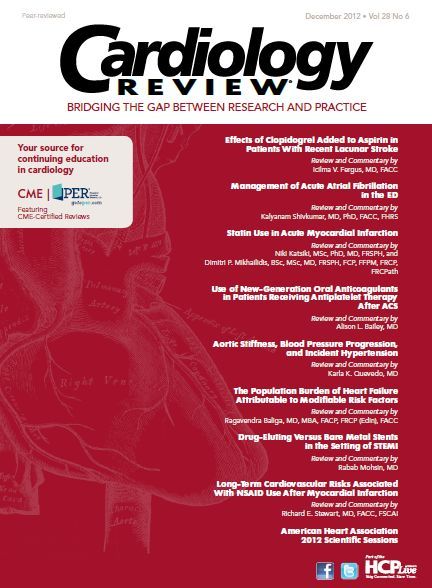The Holiday Season Issue
Debabrata Mukherjee, MD, MS, FACC
Editor-in-Chief
I hope everyone has had an enjoyable holiday season and I want to wish everyone a wonderful New Year. With the holidays over, it is back to work for most of us, and Cardiology Review will help us in getting caught up with the latest news and advances in cardiology. This particular issue of Cardiology Review discusses many important articles and viewpoints that I am sure you will find quite useful.
Dr. Alison Bailey reviews the data on the newer anti-Xa and DTI oral anticoagulants and their role following an acute coronary syndrome (ACS) and opines that larger trials are needed to fully assess the risks and benefits of these newer oral anticoagulants in patients already receiving antiplatelet therapy for ACS. For now, intense platelet inhibition continues to dominate the therapeutic landscape for ACS.
Dr. Ragavendra Baliga discusses the importance of diabetes as a risk factor for heart failure and states that identification of diabetes mellitus is emerging as an important risk factor for incident heart failure, and may help prioritize public health interventions and estimate the impact of risk-factor control policies on reducing the burden of heart failure in the general population. Dr Karla K. Quevedo looks at data on the temporal relationship between vascular stiffness and hypertension, and reflects that vascular stiffness has proved to be an important determinant of cardiovascular morbidity and mortality. Its early identification and treatment could prevent the development of hypertension, which could represent a major preventive strategy.
Dr. Kalyanam Shivkumar discusses direct current cardioversion versus pharmacologic cardioversion in atrial fibrillation with a discussion of his own experiences in clinical practice. He thinks that an accelerated approach, with expedited cardioversion when appropriate, has major advantages for the patient, ED resource management, and healthcare cost control. Dr Richard E. Stewart reviews long-term cardiovascular risks associated with NSAID use after myocardial infarction
(MI) and points out that that NSAID use among patients with first-time MI was associated with persistently increased risk of all-cause mortality and a composite of coronary death and nonfatal recurrent MI lasting at least 5 years, and that naproxen was the NSAID with the lowest relative cardiovascular risk and should be considered in post-MI patients when an NSAID is indicated.
Dr. Icilma Fergus examines the effects of clopidogrel added to aspirin in patients with recent lacunar stroke, and thinks that a different profile for lacunar strokes may partially explain why there was nonsuperiority of dual antiplatelet therapy over aspirin alone. Dr Niki Katsiki discusses statin use in acute MI and emphasizes that statin discontinuation is linked to harmful CV effects, an issue that needs to be more widely appreciated by both physicians and patients. Furthermore, measures to deal with statin intolerance may contribute to better compliance. Dr Rabab Mohsin reviews data on drug-eluting (DES) versus bare metal stents in the setting of STEMI and reflects that with innovative, new designs in stents and new antithrombotic agents, the safety and efficacy of DESs may prove better in primary PCI. Only time will tell. For our diabetes column, Dr Peter Jones reviews the obesity paradox, and concludes that a higher BMI (30-40) in people with chronic disease is good and weight loss for them would not only be a bad sign, it would not be a recommended therapy. Also of note, a higher level of cardiorespiratory fitness in obese subjects may be associated with better cardiometabolic status and a lower mortality, regardless of their BMI.
Finally, the insightful compilation of top 2012 stories by our excellent managing editor, Ms Jackie Syrop, should keep you updated on the latest happenings in this field. She discusses several key items in the news, namely the US Supreme Court upholding the Affordable Care Act, compounding pharmacy regulation issues, and blood pressure targets in patients with diabetes mellitus.
I hope that you will find these commentaries to be valuable and enjoyable. I encourage you to share your insights, thoughts, and personal experiences on the topics touched upon in this issue. I would love to hear feedback on how we can make this journal even better. My goal continues to be to make you look forward to every issue of Cardiology Review.
Debabrata Mukherjee
Editor-in-Chief
